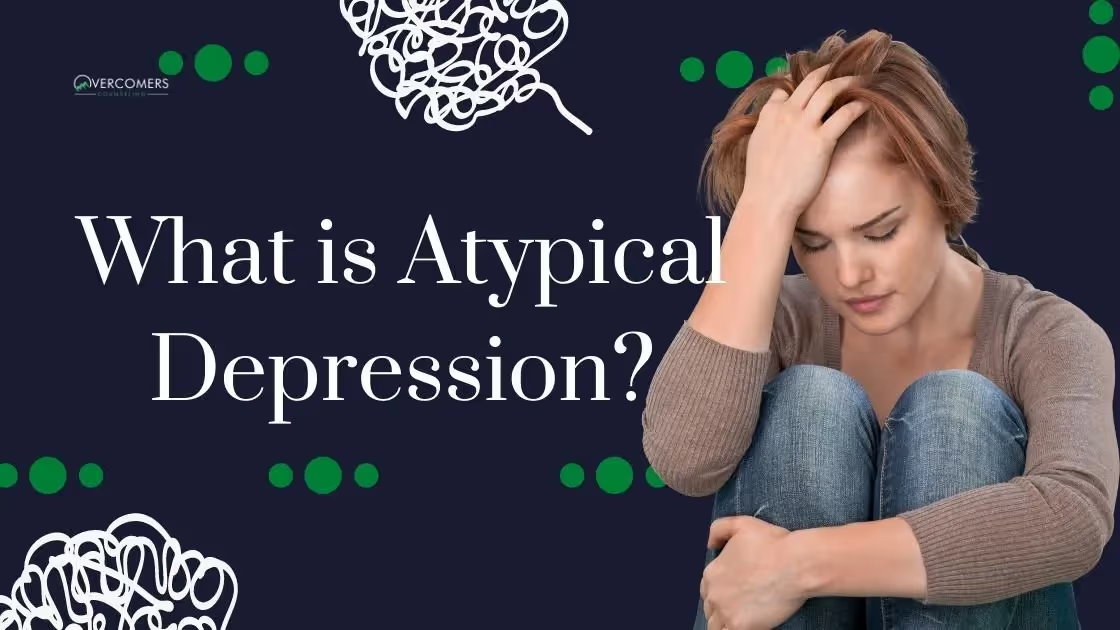You may have run across the term "atypical depression," but what does that mean exactly? It means depression with atypical features. This means that the...

You may have run across the term "atypical depression," but what does that mean exactly?
It means depression with atypical features.
This means that the depression will occasionally lift, although the person generally does not enjoy everyday life and frequently feels sad.
There are also many other symptoms, ranging from sleep issues to trouble concentrating.
Continue reading to learn more about what atypical depression means.
Atypical depression usually begins in someone's teenage years and may be long-term.
If there are positive events, a depressed mood might brighten to create depression with atypical features.
Other things that may happen include feeling rejected or criticized, feeling your legs or arms are heavy for at least an hour per day, sleeping too much, unable to sleep, or having an increased appetite.
It affects how a person thinks, feels, and behaves, and leads to not just emotional but physical problems.
A person with depression with atypical features may feel life is terrible and can have trouble with daily activities.
They might have problems concentrating or making decisions nearly every day.
Excessive guilt, and feeling worthless and hopeless are common.

People are at risk for depression with atypical features if they have inherited it.
There might also be brain differences involved.
There are naturally-occurring brain chemicals, called neurotransmitters, that transport signals to other components of your brain, as well as the body.
When the chemicals are impaired or abnormal, nerve receptor and nerve system functions change. That leads to depression.
Other risk factors include environmental stressors, recreational drug or alcohol misuse, traumatic childhood experiences, or a history of bipolar disorder.
Depression with atypical features may be tied to anxiety, work and personal relationship issues, and weight gain.
It is important for a person with atypical depression to control their stress, boost their self-esteem, and increase their resilience.
A support network, consisting of both friends and family, is useful to reach out to.
It may be necessary to participate in long-term maintenance treatment, which needs to be started at the earliest sign of atypical depression to hopefully stop it from worsening.
Before long-term treatment begins, though, your doctor will want to rule out other problems that could be causing your dip in mood.
One thing they may do is a physical exam, and ask you questions regarding your health to determine what might be causing the depression.
The doctor wants to see if an underlying physical health issue is causing the depression.
You might also want to be prepared for a blood draw that involves a complete blood count, or perhaps a thyroid test to see if the thyroid is working correctly.
When seeing a mental health professional for what could be depression with atypical features, you will undergo a psychological evaluation.
You will be asked about your thoughts, feelings, behavior, and symptoms.
To make an official diagnosis, the provider may use the American Psychiatric Association's Diagnostic and Statistical Manual of Mental Disorders (DSM-5).
Atypical depression can be found as a Major Depressive Disorder subtype.

Depending on symptom severity, someone with depression with atypical features may be directed to medications and/or psychotherapy (talk therapy).
The medications might include antidepressants, specifically monoamine oxidase inhibitors.
There are also selective serotonin reuptake inhibitors.
You may need to try a combination of many different types of medication to find what works for you, so do not be discouraged if that happens because that is normal.
If supplements interest you, clear your decision to take them with your medication prescriber first.
In psychotherapy with a mental health professional, a person with atypical depression can work to resolve trauma, improve interpersonal relationships through discussion of them, set realistic goals, and learn strategies to cope with unhealthy and negative thoughts, as well as their depressive symptoms.
Your therapist might want to try cognitive behavioral therapy, or perhaps dialectical behavioral therapy.
Aside from one-on-one with a therapist, you might be interested in group or family therapy.
One thing is to be constantly aware of your mood.
If you feel down, do not make important decisions.
That is because you might not be thinking clearly.
You also want to cut out unnecessary obligations, and set goals you know you can achieve.
When you feel down, you need to focus on yourself, and an overloaded schedule will not help with that.
With living with depression with atypical features, you will want to have a schedule.
You will want to plan each day.
We recommend using a planner, or perhaps sticky notes.
You may also want to make a list each day of the most important tasks to complete.
You might also want to keep a journal to write in on a regular basis because that will easily let you express fear, anger, pain, and other emotions.
Throughout your days you will want to have social gatherings with friends and family.
Also, there are support groups both in-person and online for people with depression.
Take some time each day to read from a self-help book.
You may also want to calm down through activities like tai chi, yoga, meditation, and progressive muscle relaxation.
You need to prioritize exercise and nutrition.
It will go a long way to help with your depression with atypical features if you have a regular exercise program where you exercise for five days a week for 30-60 minutes at a time.
Be sure to get enough sleep.
There is also deep breathing, which you may combine with mindfulness meditation.
It is also a good idea to avoid excessive alcohol and recreational drugs.
We hope you have learned a lot about depression with atypical features.
You may have seen the term "atypical" as complex, and wondered what it meant.
It means that a person with this type of depression's mood occasionally lifts in response to good events, circumstances or news.
Although this happens, the person usually still feels sad, has a range of symptoms, and needs treatment.
https://www.mayoclinic.org/diseases-conditions/atypical-depression/symptoms-causes/syc-20369747
https://my.clevelandclinic.org/health/diseases/21131-atypical-depression
https://www.psycom.net/depression.central.atypical.html
There are many helpful resources available, including support groups, online forums, books and websites dedicated to mental health and wellness. Connecting with other people struggling with the same issue can be especially beneficial. Additionally, talking to a trusted friend or family member can provide much-needed social support during difficult times.
Ignoring depression can exacerbate symptoms and make it more challenging to manage over time. This can result in a negative impact on your personal, professional, and social life, leading to feelings of isolation and even thoughts of self-harm or suicide.
Yes! There are many effective natural remedies that may be beneficial in managing depressive symptoms, such as participating in regular physical activity, changing your diet, getting adequate sleep, practicing relaxation techniques like yoga or meditation, journaling about your feelings/thoughts/emotions, seeking out social activities/support groups with other individuals struggling with similar issues
The duration of depression counseling varies for each individual, depending on the severity of their depression and their progress in therapy. Our therapists will regularly assess your progress and adjust your treatment plan as needed.
Depression is a mental disorder (a common one) that affects millions of people worldwide. It is characterized by persistent feelings of sadness, hopelessness, and loss of interest in activities once enjoyed.In this section, we will discuss the various types of depression, including major depressive disorder, persistent depressive disorder, and bipolar disorder.Gaining a deeper understanding of your depression is the first step in finding the right treatment and support.
Addressing depression is crucial because it can significantly impact your quality of life, overall well-being, and ability to function in daily activities. Left untreated, depression can lead to more severe mental health issues, relationship problems, and physical health complications.